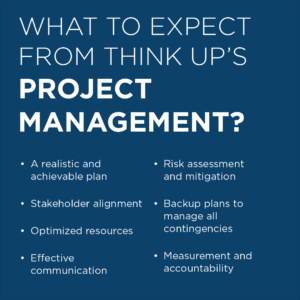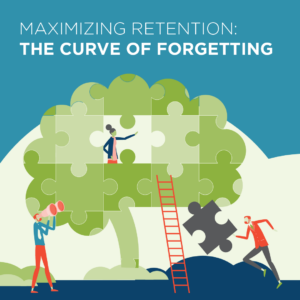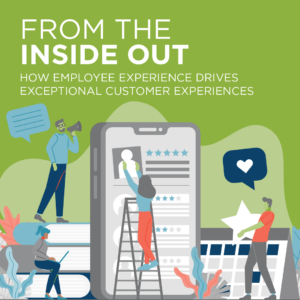Empathy has often been viewed as a “soft skill,” a way for leaders to humanize themselves in the eyes of employees. But to relegate empathy to the realm of armchair psychology for business is doing your organization a disservice, because when utilized correctly, it plays a crucial role.
Empathy – the ability to understand another person within their frame of reference – better enables communication, trust building, influence, and conflict resolution. In more strenuous times (like a pandemic), empathy can help organizations better manage the stress and fear that accompany uncertainty. It’s a practice that has applications in every corner of an organization – from the C-suite to frontline employees.
Much of the work we do at Think Up involves empathy, whether it’s helping organizations develop people-centered cultural initiatives or creating training that enables frontline employees to have more meaningful relationships with customers. That’s because fostering empathy supports employee engagement, which positively impacts both the human and business arms of your organization, whether it’s team collaboration, DEI programs, productivity, innovation, customer satisfaction and loyalty, or the bottom line. Disengaged employees, on the other hand, cost U.S. companies up to $550 billion a year (ouch!), according to a report by The Engagement Institute.
While it’s impossible for leaders to empathize with every single employee, there are ways to foster empathy throughout an organization. Here are a few thoughts on what we’ve seen work when it comes to leaders promoting empathy.
Approach Your Mission from a Human Angle: People need a mission they can get behind that is larger and more meaningful than the business function they serve. It is what matters to your organization at a human level, not just a commercial one. For one of our clients, an IT company, that human-centered mission is about removing IT-related stress from customers’ lives so they can stay productive.
Check In: How can you orchestrate meaningful conversations across a company? A simple way to make that happen is through check-ins (coffee anyone?). Encourage leaders and managers at all levels to make time to connect personally with team members. The intent should be to create a comfortable and safe environment for sharing wins, losses, ideas, and concerns; listen acutely for the spoken and unspoken; and adopt an appreciation for the perspectives of others.
Exemplify Wellbeing: Employees who are given the time to care for their emotional, mental, and physical wellbeing perform better and have the necessary energy reservoirs to care for others in your organization. When leaders block time for self-care, they send a message to everyone that they too have permission to make themselves a priority and care about their wellbeing.
Encourage Connection & Belonging: People thrive when they feel a sense of inclusion and belonging in the workplace. Creating opportunities for people to interact, whether through happy hours, a book club, employee resource groups, etc., not only fuels connectedness, but allows for the cross pollination of experiences, perspectives, and ideas that fuel…you guessed it… empathy!
While empathy is important at all times, it’s especially powerful when your organization is reeling from stress, uncertainty, fear, and anger. For leaders, the COVID-19 crisis presents an enormous challenge, but it also offers up an equally enormous opportunity. You can change the way your organization experiences hardship by leading with more empathy and promoting it at all levels.
RESOURCES:
- https://www.forbes.com/sites/margiewarrell/2020/04/13/empathy-the-skill-that-outshines-all-others-in-leading-through-crisis/#11e7feaa4436
- https://blogs.cfainstitute.org/investor/2018/08/08/empathetic-listening-a-six-step-guide/
- https://www.inc.com/ilya-pozin/top-10-underrated-leadership-traits.html
- https://www.forbes.com/sites/prudygourguechon/2017/12/26/empathy-is-an-essential-leadership-skill-and-theres-nothing-soft-about-it/#738f6ccc2b9d
- https://www.forbes.com/sites/nazbeheshti/2019/01/16/10-timely-statistics-about-the-connection-between-employee-engagement-and-wellness/#6cc42cb122a0



